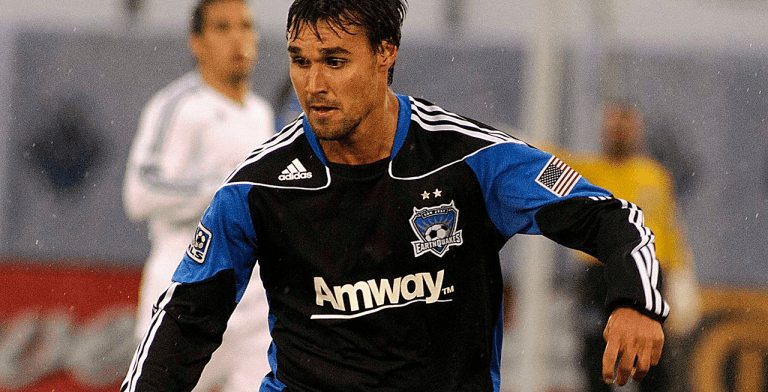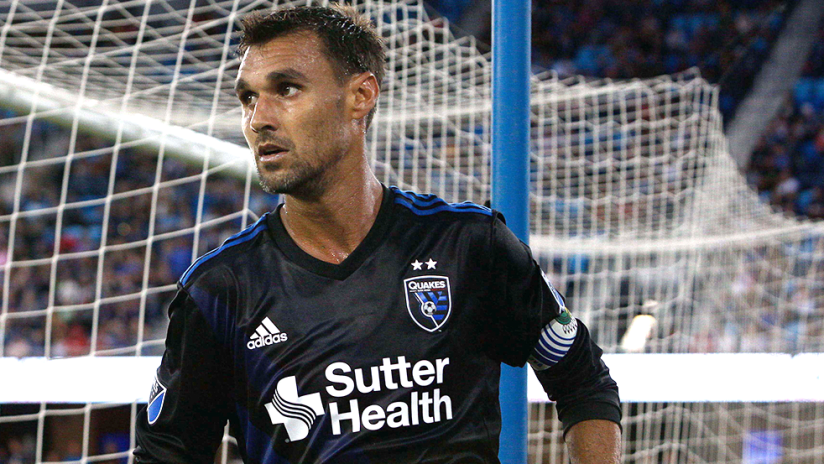YOU KNOW WHAT I still can’t wrap my head around? The second all-time leading goal scorer in MLS history went to a Division II college.
San Jose Earthquakes forward Chris Wondolowski, the guy who has a chance to surpass Landon Donovan at the top of the goals chart, got overlooked 88 times on draft day. A player who made a World Cup roster spent the first 4 1/2 years of his career on the bench. That's 54 months – long enough for tiny humans to learn to walk, talk, and ride a scooter – riding the pine. And he still has a chance to pass the guy whose name is etched on the league's MVP trophy.
It’s an incredible story. He deserves all the credit in the world. At the same time, it’s important to note that as much as he’s now ingrained into American soccer culture, Wondo almost faded into anonymity.
How does that happen? What does it say about the player? More importantly, what does it say about us?

Drafted in 2005, it took until 2010 for Chris Wondolowski to break through. | USA TODAY Sports Images
THERE'S A COMMON WORD in professional locker rooms: circumstance. Perhaps more than one’s ability, a player’s fate depends on the situation around him. Start at the wrong place at the wrong time and it can be tough to recover. The right coach or combination of surrounding talent, though, and your career can soar.
In 2005, the Quakes drafted Wondolowski in the fourth round of the Supplemental Draft (No. 89 overall). The Danville, California native made two appearances his rookie year. After moving to Houston with the club, Wondolowski made only 37 appearances through 2009. In two seasons around the same time, Zack Schilawski played 50 MLS games in New England.
“If you look at 2006 when we moved to Houston, we had Ching, Moreno, DeRo, Mullan,” says Eddie Robinson, a teammate of Wondolowski’s on the Quakes and Dynamo. “Who are you going to pick a young Chris Wondolowski over? He was a victim of circumstance.”
Wondo was deep on the depth chart, and by no fault of his own. Brian Ching was coming off a World Cup selection; Dwayne De Rosario was the franchise player; Alejandro Moreno had proven over three years that he could contribute at an MLS level; Brian Mullan was in his fourth year as a starter.
As Robinson puts it: “[Wondo] was definitely good enough, but I’ll also say I couldn’t have advocated for him to play over those other guys. What that says about Chris is how long he had to wait for his opportunity.
“The mental toughness that kid showed and the belief in himself – how many American kids growing up in the system would be that patient?”
Sometimes it’s easy to assume that self-belief is either something you have or something you don’t. A confident person is a confident person. But in reality, it’s much more dynamic, as even Wondo admits. “There were times when I doubted myself,” he says. “When I was still biding my time, I started to ask myself if I can do more than hang on the roster and actually contribute and play.
“I was unfortunate being behind big names,” Wondolowski says. “But for me, to be honest, I wasn’t ready at that moment. Some guys get their chance at the wrong time, too early or too late. Looking back, it was the perfect storm.”
We’ve all seen it: the young star gets his chance too early. The prodigy struggles through a few games, his confidence quivers and he never recovers. A few years later, fans quiz each other at the bar, trying to remember that one guy’s name. In some ways, we see it as a tragedy or potential mistake that Wondo had to wait so long. But maybe it was the only way.
After Wondo got traded back to San Jose, Earthquakes manager Frank Yallop gave the striker a chance, as the veteran manager tended to do with all new players he acquired. We know what happened next.
Shea Salinas, Wondo’s teammate for seven years and counting, played with the eventual MLS MVP when he first arrived in San Jose in 2009. He sees circumstance as only part of the equation. “Obviously there are inefficiencies, but sometimes it comes down to personal accountability. If players want to make it, it comes down to how hard they work.
“He was never entitled, thinking, ‘I should be on the field.’ He had the mentality of ‘Put my head down and grind and put myself in a position to have a chance.’"
BEYOND THE CIRCUMSTANCE of his ascension, there’s a second question we need to ask ourselves about Chris Wondolowski. For he’s not fast, nor quick; he almost never shows flashes of video game skills. There’s almost no part of the eye test that he passes. You frankly couldn’t blame anyone for missing him. At the same time, as a soccer country, we kinda need to; we need to make sure it doesn’t happen, that we don’t miss out on these players.
Like everything else, Robinson notes, it’s about understanding weaknesses and finding strengths. “He doesn’t have the pace of [Canada prodigy] Alphonso Davies. Chris is not going to be jumping over [former MLS Defender of the Year] Omar Gonzalez to win a header. It’s just not his game. He knew, and still knows, that the cerebral side of the game is where he has to excel.”
Unfortunately, it’s not an automatic tradeoff to get swindled on the physical attributes and be gifted with intelligence. Field smarts are something that accrue with hard work.
As 11-year MLS veteran Salinas says, “If you can find people with that mentality, who are willing to do anything to get better and to win, that’s what you want.”
Where does the hard work lead, then? While we certainly need competitors, it doesn’t make up for lack of quality. We should never confuse effort for being good at soccer. Wondo’s clearly good at soccer, but how? Or rather – at what?
The simple answer would be “finishing.” But what does that mean? How is one good at finishing? It’s the most important part of the game, yet you could fill an encyclopedia with managers who lost their jobs because they incorrectly assessed a “finisher.”
Robinson says that even when Wondo wasn’t getting minutes in Houston, everyone knew he was unique in front of goal. “Every day after training, the attacking players always did crossing and finishing. The defensive players would sit on the side and place friendly wagers. And 9 times out of 10, Chris Wondolowski was the first pick. Guys knew that ball would go in the back of the net.”
Sometimes soccer players sound like masons when they describe their craft – “It came to me and I banged it home, of course.” – and other times they sound like artists. Wondolowski falls into the latter category. He speaks of finishing like someone who goes on romantic walks in an 18-yard box rather than attacking it.
Additionally, like all good artists, Wondolowski breaks down the complex into the obvious. He splits finishing into two parts: finding the space in the box, and then hitting the target.
“The simple thing for me is, first, to go where there’s space. I look where there are less guys around. Second, go wherever you think the ball is going to go, or where you want the ball to go. To be a striker, you have to be the most optimistic person in the world. You have to have full belief that the ball will be there.”
In German, they would call Wondo a raumdeuter, or space finder, as they do Bayern Munich’s Thomas Muller, another player whose production seems to outweigh his physical attributes. They are players who have made their mark largely from findings ways to be forgotten. Yet finding the space (and/or the ball) is only part of the equation.
“The more you hit the target, the better,” Wondolowski says. “I call it my hybrid club. I don’t have a driver or a wedge; it’s kind of in the corner of the net and it kind of has power. It’s just repetition. The more you do something, the more you are prepared for it.”
It’s almost a perfect microcosm of the fan-player perception. We see someone who’s a good “finisher.” The finisher sees himself as someone who simply put in a lot of work.
Perhaps the better title for Wondo wouldn’t be finisher or raumdeuter, but “Shooting Practice Enthusiast”. It’s probably what Wondo would put on his business card.
THERE'S A QUESTION surrounding Wondolowski’s pursuit of the goals record that feels like an elephant in the room: Do we want him to surpass Landon? Do we want the DII player, the supplemental pick, the 54-month benchwarmer to pass the LegenD? In sports, we generally want our heroes to be larger than life. In so many ways, Wondo is the opposite of that. He’s regular. He could be you or me.
It also feels like American soccer is at a crossroads. Since the World Cup failure, we’ve been trying to figure out who we are. We’ve been searching for the soul of soccer in the country.
At times, it feels like we’re searching too hard. A soul doesn’t need to be a 5-point plan. A soul needs to be the foundation upon which we build.
Wondo took the long route to stardom. Robinson points out that everyone on the Houston team knew Wondo had the ability to be a starter, but that it would require a chance. Or, perhaps, simply sticking around long enough for one to appear.
“His mental toughness, his will, his desire, never giving up – once he got his chance he took it. Those are the biggest takeaways for me.
“I had to think about that about myself: could I have been that mentally tough?”
Perhaps Chris Wondolowski’s biggest contribution to MLS isn't the goals or the records, but rather the mirror he holds up to us all.













